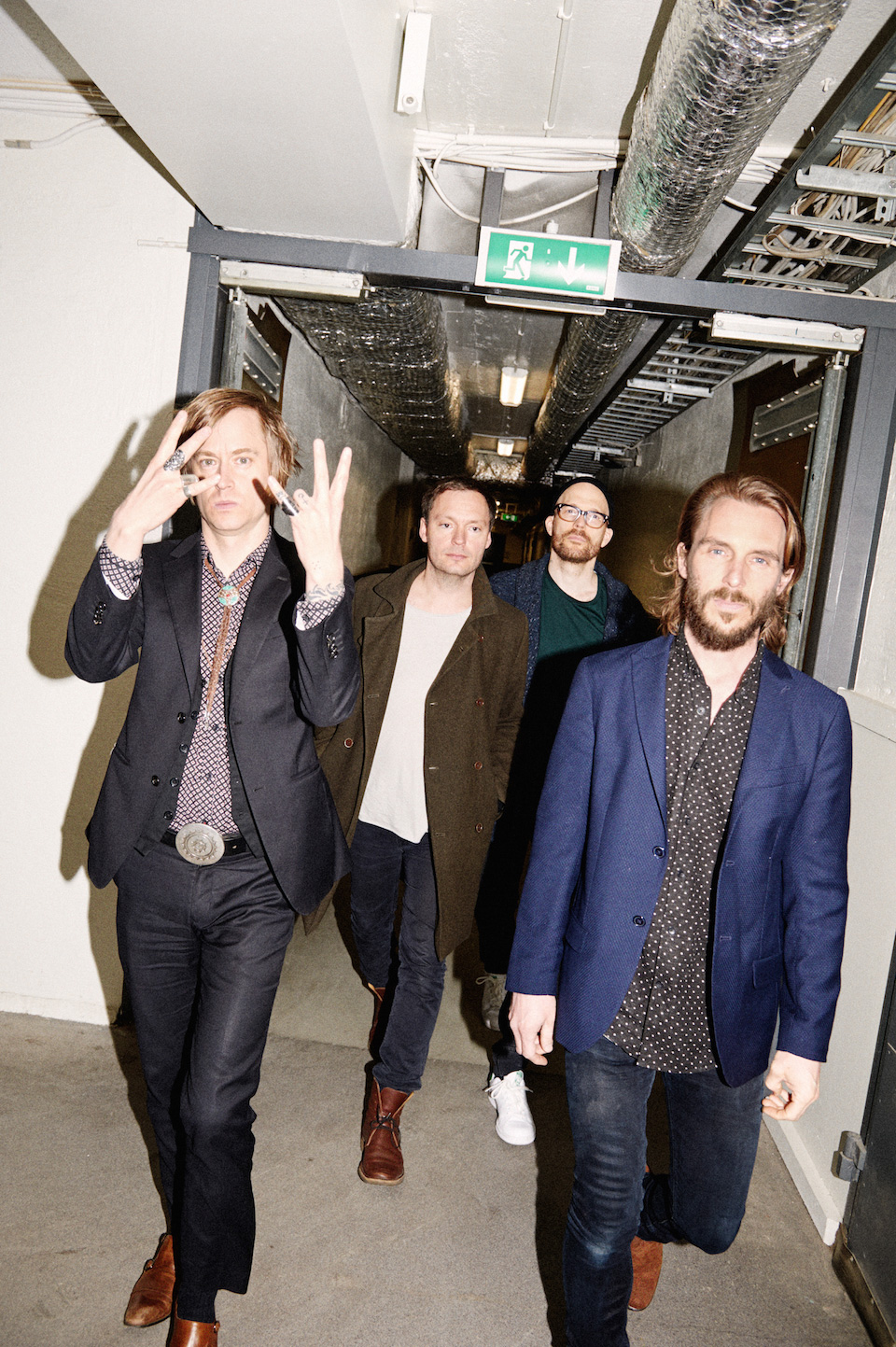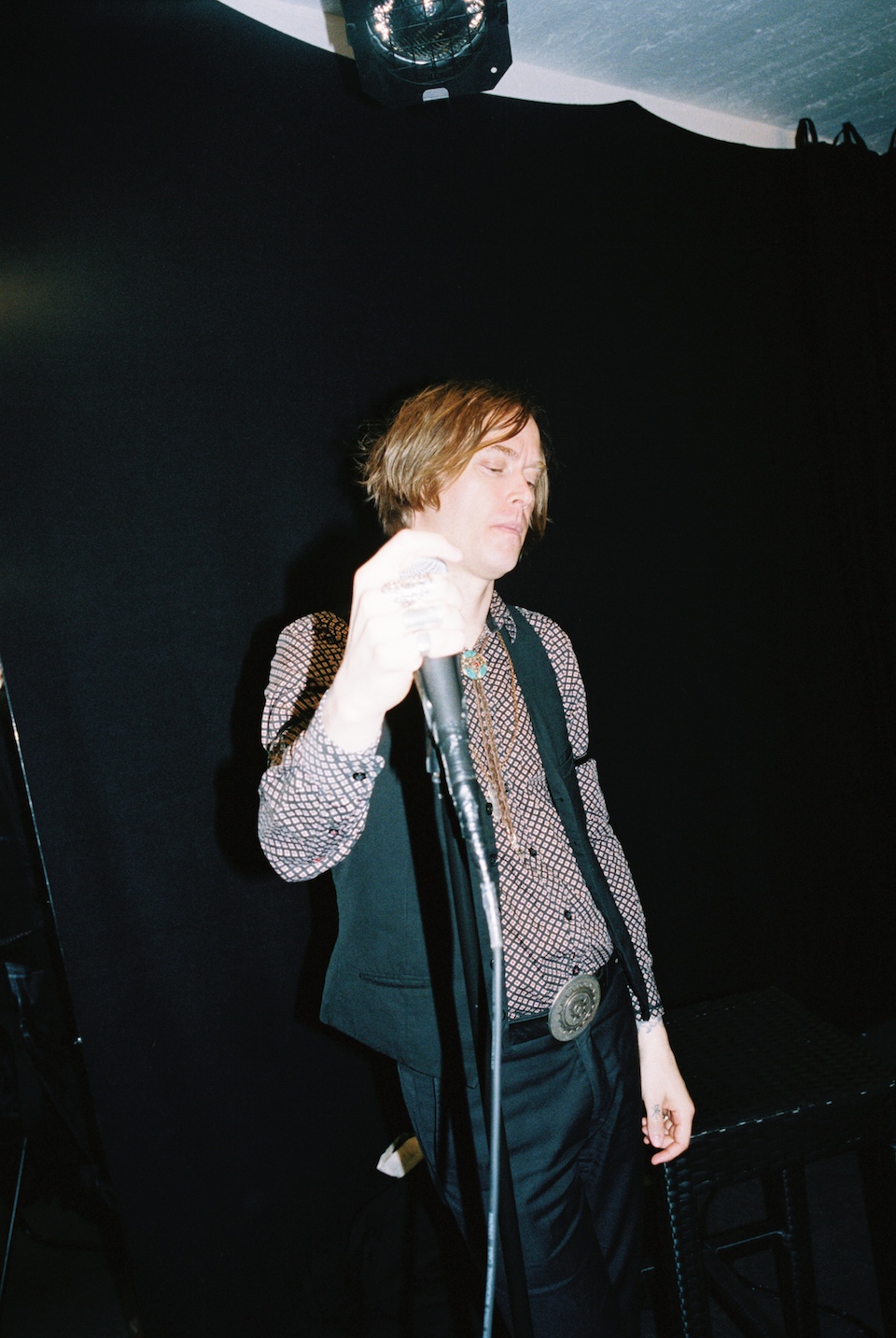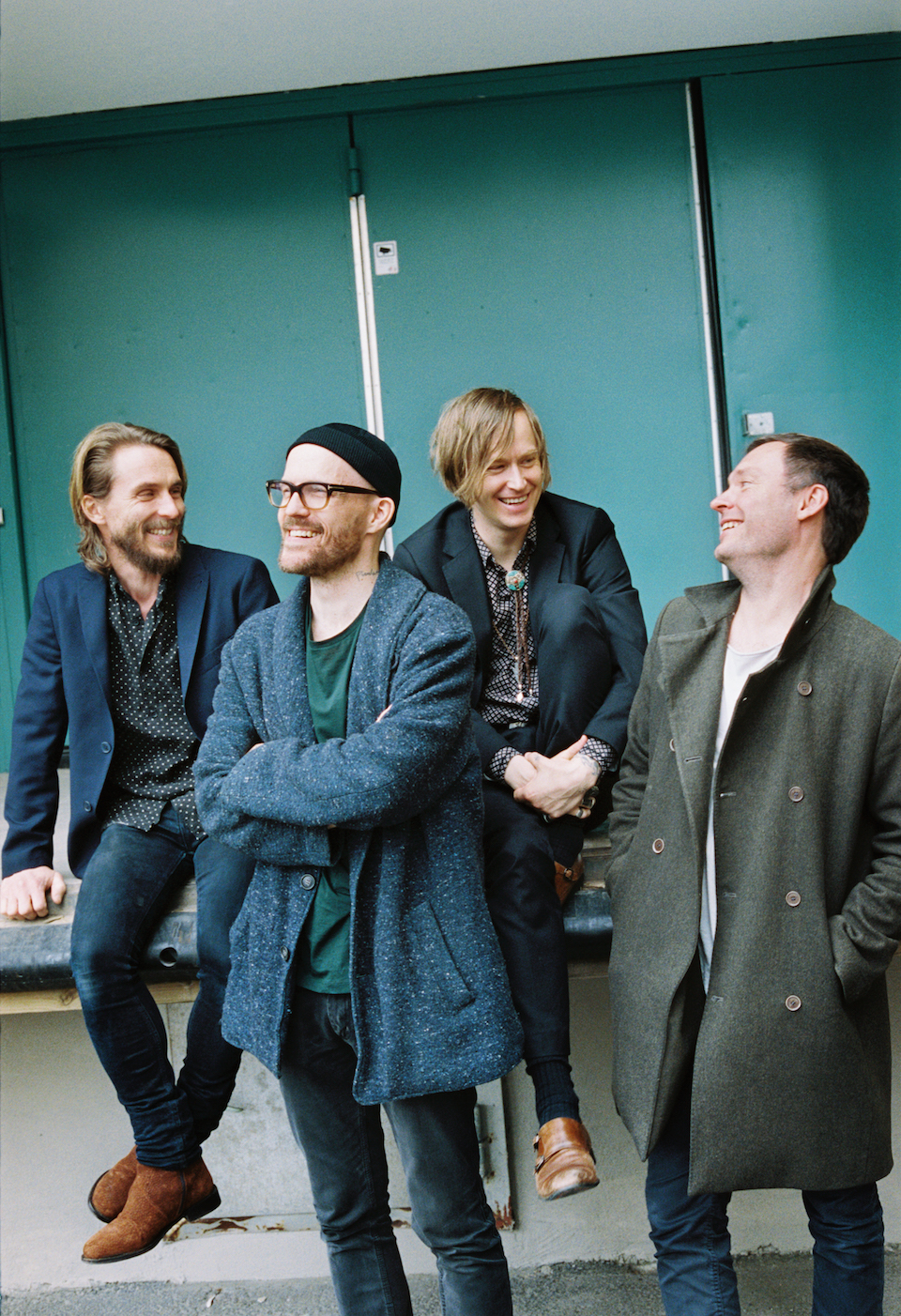The following story is taken from the summer issue of our free iPad magazine. Download it on the App Store—complete with streaming music on every spread!—and check out a complete archive of uncut features here.
Photography FELIX SWENSSON
Words MICHAEL TEDDER
For the past 17 years, Refused sat proudly alongside the Smiths and Hüsker Dü in the pantheon of bands that will never, ever, reunite. Or as the polemical Swedes proclaimed in a parting letter, “We will never try to glorify or celebrate what was. All that we have to say has been said in our music/manifestos/lyrics, and if that is not enough, you are not likely to get it anyway.”
While Refused’s seminal third album—The Shape of Punk to Come, a groundbreaking fusion of free-jazz, hardcore and fractured electronics—set the stage for bold punk bands like No Age, HEALTH and United Nations, its core members formed new projects. Dennis Lyxzén fronted the garage-rock institution the (International) Noise Conspiracy, the hardcore outfit AC4 and the folk-infused INVSN, and nearly everyone else (guitarist Kristofer Steen, drummer David Sandström and bassist Magnus Flagge) joined the avant- garde group TEXT.
But then, like a bunch of true punks, Refused got back together anyway for a Coachella appearance and well-received tour in 2012. So much for Refused being “fucking dead.” They didn’t stop there, either. Soon after firing guitarist Jon Brännström, Refused started recording Freedom, a full-length as furious and freeing as anything in its catalog. That includes two standout tracks made with Taylor Swift’s top producer, Shellback. Scoff if you will, but as Lyxzén says, Refused belongs to no one but the band itself.
It’s 2015, and you’re promoting a new Refused album. How does that feel?
At this point, it feels good. But it’s been a bit of a surreal experience, because we decided during 2012 that we’ve got to continue in some way or another. We had a good time, and we said, “Let’s do more stuff, and maybe even make more music.” But we kept it a secret, and we faked our own death, sort of, so that we could do this in peace. And when you work on something that intense and focused, it’s hard to grasp that at one point it will be released out into the world. Because it has been a secret for almost three years.
It was a bit weird at first—”Holy shit, I’m doing interviews for the new Refused right now.” That, I never thought would happen. But I feel good now.
In 2012, you wrote on the Refused website that this is just for a tour and was going to be it for the band. So you intentionally threw people off the trail.
Well, we started in 2012 and did the reunion. There was were no thoughts of doing another record, or continuing. I thought we were going to do 10 shows. And we ended up doing 82 shows. And somewhere halfway into that, and David, Kris, and Magnus asked me if I wanted to make new Refused music. I was quite skeptical.
So tell me about reuniting in 2012. I know the band had resisted for a while. What made you all eventually just change your minds and do it?
It’s just a bunch of random, small circumstances that happened. It was one of those weird instances where Kris moved back to Umeå. He hadn’t lived here in 10 years. Kris started playing guitar. He hadn’t play since 2006. And David started playing drums, and then me and David started this hardcore band called AC4, and we were playing music together. And David and Kris and Magnus started a band.
When we got the offers before, this wasn’t the case; we were scattered all over Sweden, or we didn’t play music and really hang out that much. And then when we got the offers in 2011 about doing Coachella and stuff like that, we were already hanging out and playing music together, and we were part of each other’s lives. We decided to give it a try, and here we are again. There’s a new record. I guess it was a good thing.
Had you all kept in contact just as friends after the breakup?
Well, Kris and David and Jon, they’ve always been in touch. I mean, they did a TEXT record when we broke up. I had a sort of a falling out with the other guys, but after a couple years, me and David just started hanging out again. And we’re really close friends.
It was a pretty bad breakup. So it took us a while. I think everybody needed distance from each other, and I think we need distance from what Refused was. But the next couple years, me and David started hanging out. And David’s always been the guy that … he’s in touch with everyone. He’s hanging out with everyone. He’s that guy. So we started hanging out. We started playing music, and he made us all connected again.

You express a lot of anger and outrage in your music. Was it tough for you guys to be open and patient with one another to heal your relationships?
No. I mean, in the ’90s, we were young, angry men who didn’t communicate. We couldn’t talk to each other. We didn’t know what it was to be in a band when we were young. Because we didn’t have a blueprint. We made shit up.
For me especially, I’ve played in so many bands; I’ve done so many tours; I’ve released so many records. So when we got back together, I was a very different person. One of the things that we did really early on in 2012 was that we sat down and we talked about how we felt about things. How the reunion could affect our lives, what were we going to do, and how were we going to communicate with each other. Because it is an important part.
Especially when you start playing in a band where a couple of people in the band haven’t been on the stage in 12, 14 years. It’s very important to listen to their fears and what they’re nervous about. Early on, we just decided that if we’re going to do this, we need to communicate. If you feel something is fucked up, please talk.
We’ve been pretty good at that. Especially now that we’ve decided to do a new record and continue the band, we put our egos aside. It’s one of those deals where when you’re a young kid, you come up with a part for a song, and someone says, “that’s not a good part,” you’re like, “fuck you, but I wrote that part! That part’s going to be in the song!” But now, it’s like everything that we do—when we practice, when we write, when we record, it’s always with the intention of making the song and the band better.
When did you first get a sense of the fact that The Shape of Punk to Come was reaching people even though the band was gone?
I think we did a good 80 or 100 shows on that record. Mostly in Europe. And no one cared. It was a weird thing. I mean, we peaked, as far as our popularity in the ’90s, when we did Songs to Fan the Flames of Discontent, as far as drawing hardcore kids to our shows.
So when we came to the States and we broke up, and someone made a movie about it. No one liked these records. And I went home. I started the (International) Noise Conspiracy. This is pre-internet—pre-Youtube, Google, whatever. And people started calling me from the States. This has got to be 1999. People started calling me, “They’re showing ‘New Noise’ on MTV.” I’m like, “What?”
So that’s kind of when we figured… holy shit. This resonates in people’s lives. And being in a band that goes out touring and goes out playing shows, I got constant reminders from people about how great Refused were for 14 years. Quite early on after we broke up, maybe eight months after we broke up, I’m like, “Holy shit, there’s something to this record. People are actually catching on.” It was really weird, but it’s also why we’re here today.
But did you ever feel frustrated that you couldn’t escape Refused’s shadow, even though you’re doing The (International) Noise Conspiracy and all these other things?
Yeah, of course. I mean, I hated Refused for a while. You play a fucking amazing show, or you put out a great record, and people will be like, “I love Refused.” I’m just like, “What? I just did an amazing show with Noise Conspiracy.” They’re like, “Yeah, it was great, but I love Refused.” I mean, even more frustrating, maybe, when you put out a record like the Invasionen record, and people start comparing it to Refused.
I’m like, well, this is another band, and The Shape of Punk to Come is like 14, 15 years old. And you’re still comparing it to… and people are like, “yeah, Invasionen is pretty good, but it’s not Refused.” And I’m like, “that’s fucking insane.” So the cool part now is putting out a new record, and it’s the first time in all these years that I feel like a comparison to Refused is actually going to be valid. We’ll compare Refused with Refused, which is good.
So tell me about the making of the album. How long did it take?
The process of writing was a good year and a half, almost two years, that we were actually just writing songs. Partly because life has to go on. People have families. People have other jobs. I did 110 shows with Invasionen last year. Plus, we recorded the Refused record. It was a pretty intense year for me.
So we were writing for two years. And then we started recording in October, and we were in the States for, like, five weeks. Once we got home, we did some vocals, and added some shit. Then we recorded two songs early February, and then everything was done. The basic recording was five, six weeks. And mixing took a while.
“We decide what the real legacy is going to be.
And I think it bums people out a little.”
When did you get the feeling that the music you’re working on was standing up to what you’ve done and you felt, “Yeah, this is going to work?”
As I said, I was very skeptical. When the other guys asked me, do you want to do Refused again, my first instinct was, of course not, that is insane. Why would we do that? And partly because I was doing other music, but also because of the legacy. Because of the shadow.
The thing was, Magnus and Kris and David had been playing together; they had a bunch of sketches for songs. They were instrumental and pretty dense and weird, but they showed me a bunch of riffs. I’m pretty sure if those ideas wouldn’t have been there, I don’t think it could have happened. I listened to it, and I was like, “Wow, these are really good ideas. This could actually be something.” And then I mulled it over for a while, and I started writing lyrics, and got with David and started doing vocals.
You’ve got to trust your instincts. And you’ve got to trust the music. And after a while, I remember talking about it, and Kris just looked at me and said, “This is much better than Shape of Punk to Come.”
So we’re just going to make this amazing record and hopefully people will like it. It’s one of those weird things with music. Because you can’t reproduce how people felt the first time they heard your songs.

Mmm-hmmm.
We know this. We’re very aware of the fact that a lot of people lived with Shape of Punk to Come for like 17 years. It’s been their favorite record for a long time, and it’s shaped them into who they are. It’s one of those records that people love. It’s pretty crazy. So when you’re a band, you’re like, “Okay, if we’re going to compete with that record, we have to make the record fucking spectacular and hope that people will have an open mind.”
Also, I think a lot of people love Refused because it was a done deal. We have this myth or this air around us: They broke up. The cops stormed in on their last show. It’s perfect. And then we show up, and we’re like, we’re back. And I think for a lot of people, that’s frustrating.
Some people would rather love a myth than a working band.
The four of us, we decide the fate of our band. We decide what the real legacy is going to be. And I think it bums people out a little.
Like with the last album, you touch on a lot of different genres on the new one. You cram a lot of things into hardcore, but you make it all work. So tell me how you came to work with Shellback on “Elektra,” the first single. What made you guys decide to work with a pop songwriter on a song?
Honestly, I don’t give a shit about number one hit singles on Billboard. That does not interest me. I don’t like that sort of aesthetic. I don’t care for it, and it doesn’t impress me. He learned how to play drums listening to Refused records. And we met him, and we heard about who he was and we’re like, “Oh, that’s pretty crazy.”
When you write, it’s a very close circuit. It’s the four of us in a room. If there’s four experts on Refused, it’s the four of us. But then we said, maybe we should have someone else listen to a couple of these songs and get some outside input. And then David said, “Well, I’ve been talking to Shellback; maybe we should send him a couple of demos. Maybe he’ll pull out some ideas about the vocals or he’ll be, like, ‘Make that chorus longer. That’s a fucking great part, you should double that.'” That kind of thing. And we didn’t hear back from him.
Then a week before we were going to go to America to record, he sends us a demo of “Elektra” with him playing drums, guitar, bass and sings in, like, fake English. And we were just like, “what the fuck,” because our version of “Elektra” was almost seven minutes long, and it was like this really fucking weird, slow-moving monster. And he sends us a demo that’s, like, two minutes long. And Kris calls him up, and he’s like, “Yup, Shellback’s version’s better than ours.”
Ha!
And were also like, fuck that. This is fucked because we were working on “Elektra” for, like, two and a half years, and he makes a better version, and we’re like, “Fuck.” So we go to the States and we record with Nick Launay, and it fucks with our heads, and we try to make a mix between his version and our version. And we spend days working on “Elektra,” because we knew that that was going to be the centerpiece of the record.
When we came home and listened to some rough mixes, David calls me up a month after we come home, and he’s like, yeah, “Elektra” is not good, we have to re-record it. And I almost start crying. “Fuck that, I have done vocals on that song, like, a 1000 times. I don’t want to re-record it.” Then we talked about it, and we were like, “Yeah, it didn’t turn out as good as we wanted to.” And the same thing with the song “366.” I mean, our version… it felt tired. When we’re in the States, Shellback sends us a demo of “366,” which was pretty much our song, but just a slightly more efficient arrangement. So we just said, “okay, maybe we should just try to do these songs with Shellback.” So we asked him, and he said yes. So he’s on the record because he brought out the best of those two songs.
If you listen to the record, just front to back, and someone says two of these songs are produced by Taylor Swift’s producer, guess which ones, I don’t think anyone’s going to pick “Elektra” or “366.”
In a way, the most outrageous move you could possibly do is to work with someone like that.
We have always been open to the masses. The fans are like, “Why this guy? He’s worked with all these pop people.” But just try to break down the drama and the limits you create for yourself. David calls me up, and says, “It has to be in the press release. It has to say Taylor Swift and P!nk.” And I’m like, “Yes, it has to.” Because we knew that it was going to annoy people. And we knew it was going to get people on Facebook going “fucking sellouts.”
“It is a bummer when that stuff happens. I take it very seriously.”
Your band’s always had an anti-capitalist bent to it. Was that a concern that people would think, “Oh, they’re just cashing in on their name now”?
No. Never. One thing that worried me about it is that people in the year 2015 doesn’t know what capitalism means. That worries me. It is a weird idea that someone says, “You made money from your work. Then you are a capitalist.” That’s not the definition of capitalism; that’s just me working. We wouldn’t do it for the money. This is not a cash grab. The record—we paid for it ourselves. We went to the States recording the record without a label, without anyone backing us. We just said, we need to do this record. If we wanted to milk it, it would have been safer to have gone around for another two or three years playing Shape of Punk to Come. I think it’s a bit more risky to make a new record.
You mentioned before that the four of you were the experts on Refused. What happened with your former guitarist, Jon Brännström?
Without going into details, sometimes you have dynamics in a relationship that don’t really work out. It doesn’t function the way you want it to. It didn’t work out; he didn’t like being on tour.
When we decided we’re going to continue, Kris had a talk with him and said, we want to continue without you. And obviously, he was upset. It’s very understandable. He was part of this band for 20 years, and he plays on two of our records.
In our lives it wasn’t much of a drama, and then it became a Facebook drama for a little bit, but I think he, as an ex-member of the band, he has every right to speak his mind. And I thought that was great. We let it stay on the Facebook page. If that’s how he feels, let people know that. And then we can sort of carry on and do our stuff.
It is a bummer when that stuff happens. I take it very seriously. Every time Dave Lombardo gets kicked out of Slayer I get super upset. I don’t know the dynamics. I don’t know what’s going on behind the scenes, but I get upset. “Fuck, they’re kicking out Dave Lombardo again. What the hell’s going on?” I know that feeling. The only thing we can do is come out and play shows and hopefully prove to people that it’s better than ever. I mean, he will be missed on stage, he was a fucking wild man on stage.
What are you going to do for the live show? Are you getting a touring guitar player?
Yes, we have a guitar player playing live. His name is Mattias [Bärjed], and he used to play in The Soundtrack of Our Lives. They’re this Swedish band. They did eight records in around 14 years. They were a fantastic band. We toured with one of his bands in 1996, so we’ve just known him forever. So he’s going to be our touring guitar player.
Changing topics a little bit, your music’s always touched on current events and rising up against oppressive forces. When you see things like Ferguson riots or the Occupy movement, does it make you feel like you need to add your voice to the discussion that’s going on?
Yes and no. This record that we are about to put out, it is a record chock full of political, current affairs and existential issues. It’s the most political record I have put out, almost.
We always do that. But I think that the difference this time around is that it’s more of a focus on European issues than American issues. That song “366” talks about the refugee fucking disaster, that people are going through the desert from Syria or Africa, and we sink their boats, and thousands of people are drowning, and the people that make it over, they become slaves in plantations where we grow tomatoes.
We are a very topical band. I never saw music as a career, and I never thought, “If I say this, then maybe we’ll lose some fans if we speak out.” We’ve never been that type of band. We are fucking loudmouths; we are self-taught smart-asses, and we talk about the world as we see it, and we talk about the problems that we see. Hopefully some of it will resonate with people, and some of it might not.

It’s interesting, because for a while, I think music is a largely apolitical both in the underground and the mainstream. But the last few years, we’ve seen more things rising up. Like, I don’t know if you follow rap, but we’ve had Killer Mike, Kendrick Lamar, the D’Angelo album, Against Me!… It does seem more people are starting to speak up their music than they have in the past few years.
I think so too, It’s funny because, I don’t listen to hip-hop music at all, but David does that a lot. That’s where he finds the radical lyrics right now, where you find people really coming into politics. I mean, punk in its essence—the subculture—has always been rebel music. But it also has become diluted to grown men in shorts. Music as an entity has been reduced to the lowest common denominator, pap entertainment.
At one point in time, music was art. Musicians, poets, painters, and authors were hanging out together. And now music is solely bullshit entertainment. It is distractions, I think. I think this whole world is distractions. We live in an ideology that sets up distractions so we don’t have to worry. We don’t worry about Wall Street, we don’t worry about the Mediterranean, we worry about watching another episode of Two and a Half Men.
I think that’s kind of what the world has become, and of course people are going to react to that. People are going to say you need to talk about what actually goes on, which is good. So hopefully, the sort of bullshit world that we live in, and this sort of bullshit music culture that we have now will be destroyed.
“We were angry young men, and we spoke our mind. It was like, fuck this, burn all the photos, fuck everyone. I thought it was brilliant.”
Is it tough to break through all that noise and find people who want to listen?
Yeah, of course. It is an endless tirade of bullshit that you just have to wade through. At the end of the day, my ambition has never been to become huge. My ambition has never been to become successful. My ambition in life has just been to play music, and to speak my mind.
Some of my friends asked me, “What are you going to do if nothing happens with this new Refused record?” I’ll just make another record. I will just continue to play music. If you’re lucky, like Refused was in the ’90s, you can sort of slide through one of these cracks. I’m hoping that’s what we’re going to do this time around as well. We’ll be the exception to the rule, and I think the world needs it. I think the world needs intelligent music, not only politically, but also in the sort of approach to music. Because music is a primal force that really could change our lives and it could make us feel these spiritual awakenings, and it doesn’t anymore. Because it is just solely entertainment.
A couple of years ago, Refused was awarded the special prize for Swedish music exports by the Minister of Trade. What was that like for you?
It’s super weird. I mean, my first instinct was, of course, fuck these people. Because it was a right-wing government at the time. But then, me and David talked about it. I mean, there’s this old punk law of you boycott shit, “we’re better than them” that still lives with me a little bit. The truth of the matter is that if we would have said, “we’re not going to show up and collect your prize,” the government would not be like, “Yeah let’s fold. Refused did not show up to collect this prize. We’ve been in the wrong for the last six years.” So we said let’s go there and just say something.
The right-wing minister was giving us this award, talking about our revolutionary lyrics, and we just started talking about the stuff that formed us, and stuff that made us political. We talked about the leftist cultural politics that enables people to play in bands, and enables people to play music, and get rehearsal space. And we talked about the Swedish foreign minister’s dealings with an oil company in Sudan. And people got pissed off. And it was super awkward. We had ministers and fucking movers and shakers from the government just glaring at us. It was fantastic. We got an award and I took it home and we got to go to the government’s fucking building and make everybody uncomfortable. Good times.
Now that your band is working again, getting along together and working on music, do you wish you hadn’t been so insistent with the entire Refused is Fucking Dead thing?
[Laughs] No. No. No. That last manifesto that I wrote, the angry letter to the press. It was awesome. It’s a part of the puzzle, it’s a part of the history, it’s a part of the legacy of Refused. The only thing that kind of bums me out is for the next couple of months, there’s going to be a lot of crappy headlines, like “Refused are Fucking Alive,” and we’re going to have to deal with that.
Apart from that, no. It’s a part of the fucking legacy, and I’m proud of that. We were angry fucking young men, and we spoke our mind. It was like, fuck this, burn all the photos, fuck everyone. I thought it was brilliant. I still think it is brilliant.



